“I could have appeared just like an ordinary child,” the Lord said, “but you may have doubted who I really am.”
Adapted by Amala-bhakta dasa from Krsna, the Supreme Personality of Godhead,
by His Divine Grace A. C. Bhaktivedanta Swami Prabhupada.
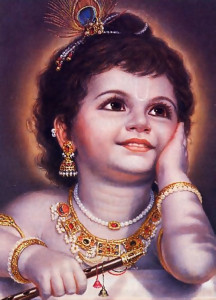
Once, thousands of years ago, the world was overburdened by the unnecessary defense forces of different kings who were actually demons but were posing themselves as the royal order. At that time the whole world became perturbed, so the predominating deity of the planet earth, known as Bhumi, went to see Lord Brahma, the creator of the universe. Bhumi assumed the form of a cow, presented herself before Lord Brahma with tears in her eyes, and related to him the calamitous condition of the earth.
Lord Brahma became much aggrieved after hearing from Bhumi, so he, along with Bhumi and all the other demigods, journeyed to the spiritual planet of Svetadvipa, where the Supreme Lord Visnu resides. There, on the shore of the ocean of milk. Lord Brahma began to pacify Lord Visnu with prayers. Next, he sat in meditation for a while, received a message in his heart from Lord Visnu, and then broadcast it to the demigods. The message was as follows:
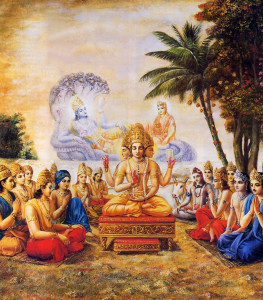
I, the Supreme Personality of Godhead, will appear on earth very soon along with My supremely powerful potencies. As long as I remain to execute My mission of annihilating the demons and establishing the devotees, the demigods should also remain there to assist Me. They should all immediately take birth in the Yadu dynasty, wherein I will also appear in due course of time.
After instructing and pacifying Bhumi and all the demigods with sweet words, Lord Brahma departed for his own planet, Brahmaloka.
The leader of the Yadu dynasty. King Surasena, was ruling over the district known as Mathura. Because of King Surasena’s rule, Mathura became the capital city of the Yadu dynasty kings, who were all very pious.
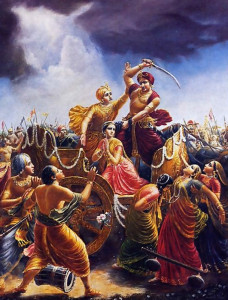
One time, Vasudeva, the son of Surasena, just after marrying Devaki, was going home on his chariot with his bride. At that time, Kamsa, the son of King Ugrasena, to please his sister Devaki. had voluntarily taken the reins of the horses of Vasudeva’s chariot. According to the custom of Vedic civilization, when a girl is married, the brother takes the sister and brother-in-law to their home. Because the bride may feel too much grief over the separation from her family, her brother goes with her until she reaches her father-in-law’s house.
While the bride and bridegroom were riding on the chariot, musicians were playing jubilantly on conchshells, bugles, drums, and kettledrums to mark the auspicious occasion. The procession was proceeding very pleasingly, when suddenly from the sky a miraculous voice boomed:
“Kamsa, you are such a fool! You are driving the chariot of your sister and your brother-in-law, but you do not know that their eighth child will kill you!”
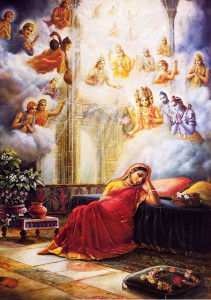
After hearing the prophecy from the sky, Kamsa, because he was very demoniac, immediately caught hold of Devaki’s hair and was just about to kill her with his sword. But Vasudeva, astonished, then attempted to pacify his cruel, shameless brother-in-law and said:
“My dear Kamsa, you are the most famous king of the Bhoja dynasty. And people know that you are the greatest warrior and valiant king. How is it that you arc so infuriated that you are prepared to kill a woman—your own sister—at this auspicious time of her marriage? Why are you so afraid of death? From the very day you took your birth, you began to die. And when you do die. you will receive another body by the arrangement of material nature. Therefore, having nothing really to fear. please do not be overwhelmed by Ihe dictation of your mind and body.
But Kamsa was not at all pacified, so Vasudeva tried another tack: “My dear brother-in-law, please consider that you have no danger from your sister. The danger is to come from the sons of your sister, who are not present now. And who knows? There may or may not be sons in the future. Considering all this, you are safe for the present. But if Devaki does give birth to sons, I promise that I shall present all of them to you for necessary action.”
Kamsa knew the value of Vasudeva’s word of honor and was convinced by his argument. So, for the time being he desisted from killing his sister. Vasudeva was very relieved and, after praising Kamsa’s decision, returned with Devaki to his home.
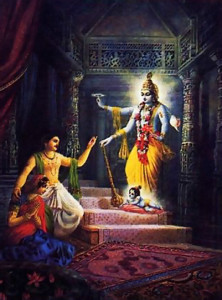
When the first son was born, Vasudeva immediately brought the child before Kamsa. Kamsa was pleased to see Vasudeva keeping his promise. Feeling somewhat compassionate, he said, “My dear Vasudeva, you need not give this child to me, for it is your eighth child that is supposed to kill me. You can take him back.”
When Vasudeva was returning home with his first-born child, he was pleased by Kamsa’s behavior. But he knew that Kamsa, who lacked self-control, could change his mind at any moment.
At that time the great sage Narada visited Kamsa, and he heard about Kamsa’s returning Vasudeva’s first-born child. Narada was eager to accelerate the descent of Lord Krsna. He therefore informed Kamsa that personalities in Vrndavana like Nanda Maharaja, all the cowherd men and girls, and the wives of the cowherd men, as well as Vasudeva, Surasena, and all of Vasudeva’s relatives born in the Yadu dynasty, were preparing for the appearance of the Supreme Lord. Narada warned Kamsa to be careful of his so-called friends and well-wishers in those families. They were actually demigods who had taken birth in the Yadu dynasty to prepare for Lord Krsna’s appearance.
Kamsa at once became alert. He understood that since the demigods had already taken birth. Lord Visnu, or Krsna, must be coming soon. Therefore, he at once arrested Vasudeva and Devaki and shackled them behind prison bars.
With in the prison Devaki gave birth to a male child year after year. And Kamsa, thinking each of the babies to be the incarnation of Visnu, killed each one of them. Though he was particularly afraid of the eighth child, after the visit of Narada he came to the conclusion that any of the children might be Krsna. Therefore, he felt it was safer to kill all the babies.
Kamsa also imprisoned his father because he was the chief king among the Yadu, Bhoja, and Andhaka dynasties. And he occupied the kingdom of Surasena, Vasudeva’s father. Thus he declared himself the king of all these places.
Kamsa made alliances with other demoniac kings, until he became the strongest of leaders. Then he began to behave most hatefully toward the Yadu dynasty, in which Krsna was soon to take birth.
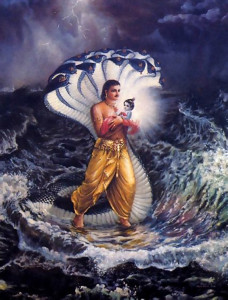
When Devaki became pregnant for the seventh time, a plenary expansion of Krsna known as Ananta Sesa appeared within her womb. At that time, Krsna ordered his principal potency, Yogamaya, to take birth in the village of Vrndavana, which was near Mathura. There, Rohini, one of the wives of Vasudeva, was residing at the house of Nanda and Yasoda. Not only Rohini, but many others of the Yadu dynasty were scattered all over the country out of fear of Kamsa’s atrocities. Some of them were even living in mountain caves.
The Lord said to Yogamaya, “My plenary expansion Ananta Sesa is within the womb of Devaki. He is the source of all spiritual power and is the original spiritual master. He shall be known as Balarama. You can arrange the transfer of Ananta Sesa from the womb of Devaki to the womb of Rohini. After this arrangement, I am going to appear in the womb of Devaki, with My full potencies, as her son. And you will appear as the daughter of Nanda and Yasoda in Vrndavana.”
After Ananta Sesa was transferred from Devaki’s womb to Rohini’s, people believed that Devaki’s seventh pregnancy had been a miscarriage.
Thereafter, the Supreme Personality of Godhead, Krsna, entered the heart of Vasudeva. He then transferred Himself to the heart of Devaki and from there entered her womb. It was by immaculate conception—that is, without the use of seminal discharge—that the Lord chose to appear in Devaki’s womb.
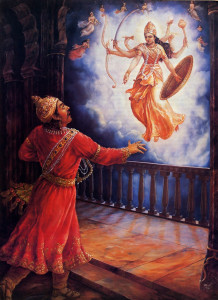
When Kamsa looked at his sister and saw her glowing, transcendental beauty, he at once concluded that the Supreme Personality of Godhead had taken shelter in her womb. Kamsa then began to brood: “What is to be done with Devaki? Surely she has Visnu or Krsna within her womb, so it is certain that Visnu has come to kill me. If I kill Devaki now, Visnu will enforce His supreme will more vehemently. Besides, killing her would be a most abominable act and would spoil my reputation, for Devaki is a woman, she is under my shelter, and she is pregnant. Moreover, I would lose the results of my pious activities and the normal duration of my life. People would curse me. I might even go to the darkest region of hell.” Kamsa thus meditated on all the pros and cons of killing Devaki. He finally decided not to kill her, but to wait for her child to be born and—then kill Him!
At this time Lord Brahma and Lord Siva, accompanied by great sages like Narada and followed by many other demigods, invisibly came into the house of Kamsa. They began to worship and pray to the Supreme Personality of Godhead, who was within Devaki’s womb. After doing so, the demigods, with Lord Brahma and Lord Siva in front of them, returned to their heavenly abodes.
When it was time for the Lord to appear, the constellations in the sky became very auspicious. In all directions there was an atmosphere of peace and prosperity: flowers bloomed, birds sang, peacocks danced, and the wind blew pleasantly. The celestials sang, danced, and offered prayers to the Lord. The demigods showered flowers from the sky. The waves at the seashore were mild, and the clouds rumbled delightfully.
Then Lord Visnu, who resides in the heart of every living being, took birth in the darkness of night, appearing before Devaki like the full moon rising on the eastern horizon.
It was obvious that He was none other than Lord Visnu, for He had four hands, which held a conchshell, a club, a disc, and a lotus flower. His chest was decorated with the mark of srivatsa, a curl of golden hair; He wore a jeweled necklace of kaustubha stone; and He was clothed in yellow silk. He looked dazzling, like a bright blackish cloud. He also wore a helmet inlaid with the vaidurya stone, sported valuable bracelets, earrings, and other similar ornaments all over His body, and had an abundance of hair on His head.
Vasudeva was struck with wonder. As he looked at his newborn baby, he was so happy that in celebration he mentally gave away thousands of cows in charity to the brahmanas. Then he bowed with folded hands and began to offer the Lord heartfelt prayers. Vasudeva was in a transcendental state, and he became completely free from all fear of Kamsa.
After Vasudeva finished his prayers, Devaki offered hers. She was very frightened because of her brother’s atrocities, so she begged:
My Lord, please save me from the cruel hands of Kamsa. for You are always ready to give protection to Your servitors. My only cause of fear from my brother Kamsa is due to Your appearance. Kamsa may not know that You are already born. Therefore, I entreat You to conceal Your four-armed form so that You will not be easily recognizable, and then perhaps I can hide You somewhere from Kamsa.
But Krsna replied,
I appeared in this Visnu form just to convince you that I. the Supreme Personality of Godhead, have again taken birth. I could have appeared just like an ordinary child, but then you may have doubted who I really am. I know you are very concerned about Me and afraid of Kamsa, and to allay those fears, here is what is to be done: Father, I want you to take Me to Gokula immediately. There, you will find that Yasoda has just given birth to a daughter. You will replace her daughter with Me and then bring her daughter back here.
Having spoken thus, the Lord transformed Himself into an ordinary two-armed child and remained silent.
Vasudeva took Krsna and walked out of the prison within Kamsa’s palace. By the arrangement of Yogamaya, Krsna’s internal potency, all the residents of the palace were overwhelmed with deep sleep, and all the palace doors and gates, which had been locked and shackled with chains, suddenly opened.
The night was very dark, but as soon as Vasudeva took Krsna and went out, as a result of Krsna’s glaring effulgence he could see everything, just as in the sunlight.
At the same time, there was thunder in the sky and severe rainfall. While Vasudeva was carry ing his son through the falling rain, Ananta Sesa appeared there in the shape of a serpent and spread His hood like an umbrella over the head of Vasudeva so that he would not be hampered by the rainfall.
When Vasudeva reached the bank of the Yamuna River, he saw that the water of the Yamuna was roaring with waves and that the whole span was full of foam. Still, in that furious feature, the river gave passage to Vasudeva, and he was able to cross it very easily.
On the other side he went to the home of Nanda Maharaja, situated in Gokula, where he saw that all the cowherd men were fast asleep. He silently entered the house without difficulty and replaced Yasoda’s newborn girl with his son. Then he crossed the river again, returned to the prison, and closed all the doors and gates. He silently placed the baby girl on Devaki’s lap and reclamped the shackles on himself so that Kamsa could not understand what had happened.
In Gokula, when Yasoda had given birth, she was so tired from the labor of delivery that she fell fast asleep. When she awoke, she could not remember whether she had given birth to a male or female child.
After Vasudeva reentered his cell, the gatekeepers awoke and heard the newborn child crying. They immediately hastened to Kamsa’s bedroom to inform him. Kamsa jumped out of his bed and exclaimed, “Now the cruel death of my life has been born!” He became perplexed, his bodily hairs stood on end, and he hurried to the cell where Krsna had been born.
DevakI, on seeing Kamsa approaching, meekly prayed to him: “My dear brother, my child is a female. Please do not kill her. When she is of age, I promise to give her to your son as a wife. According to the omen, you are not to be killed by a female, but by a male.”
Nonetheless, Kamsa was so cruel that he did not listen to Devaki’s prayers. Instead, to rebuke her, he forcibly grabbed the newborn child and was just about to mercilessly dash her onto the stone floor. However, the child, Yogamaya, having miraculous powers, flew out of his hands and up into the air and mystically hovered there—as the goddess Durga. She was decorated with a gorgeous dress, flower garlands, and ornaments, and in her eight hands she held a bow, a lance, arrows, a sword, a conchshell, a disc, a club, and a shield.
Seeing the glorious child, all the demigods appeared there, presented her with gifts, and offered their respective prayers. Then the goddess said to Kamsa, “You rascal! How can you kill me? The child who will kill you has already been born somewhere within this world. So don’t be so cruel to your poor sister!”
Kamsa then became overwhelmed with fear. Out of pity and guilt, he unshackled and freed Vasudeva and Devaki. Then he apologized very politely and effusively for his past atrocities against their newborn children.
When Devaki and Vasudeva saw Kamsa so repentant, they became pacified. Vasudeva then spoke to him in a very forgiving and philosophical manner. Kamsa became exceedingly pleased, and his guilt for having killed his nephews subsided. With the permission of Devaki and Vasudeva, he returned to his chambers with a relieved mind.
But the next day Kamsa called all his counselors together and narrated to them all the incidents that had happened the night before. All the counselors of Kamsa were demons and eternal enemies of the demigods, so they became depressed upon hearing their master speak of the night’s events. And although they were not very experienced or learned, they began to instruct Kamsa as follows: “Dear sir, let us now make arrangements to kill all children who were born within the last ten days in all towns, counties, villages, and pasturing grounds. Let us execute this plan indiscriminately.”
Thus being advised by the demoniac ministers, Kamsa, who was from the very beginning the greatest rascal, decided to follow their advice. Thereafter, for many years, Kamsa sent demons to Vrndavana to kill Krsna. But Krsna, being the Supreme Lord, easily killed all of them. Krsna’s defeating the demons sent by Kamsa, as well as many of Krsna’s other transcendental pastimes, are narrated in Krsna, the Supreme Personality of Godhead, by His Divine Grace A. C. Bhaktivedanta Swami Prabhupada.

Leave a Reply